Complete Works of Homer Read online
THE COMPLETE WORKS OF
HOMER
Contents
The Translations
THE ILIAD
CAST OF CHARACTERS
THE ILIAD – Chapman’s Translation
THE ILIAD – Pope’s Translation
THE ILIAD – Cowper’s Translation
THE ILIAD – Butler’s Translation
THE ILIAD – Lang’s Translation
THE ILIAD – Buckley’s Translation
THE ILIAD – Derby’s Translation
THE ODYSSEY
CAST OF CHARACTERS
THE ODYSSEY – Pope’s Translation
THE ODYSSEY – Cowper’s Translation
THE ODYSSEY – Lang’s Translation
THE ODYSSEY – Butler’s Translation
THE ADVENTURES OF ULYSSES – Charles Lamb
THE HOMERIC HYMNS
FRAGMENTS AND SPURIOUS WORKS
HOMER'S EPIGRAMS
FRAGMENTS OF LOST EPIC POEMS
THE WAR OF THE TITANS
THE STORY OF OEDIPUS
THE THEBAID
THE EPIGONI
THE CYPRIA
THE AETHIOPIS
THE LITTLE ILIAD
THE SACK OF ILIUM
THE RETURNS
THE TELEGONY
NON-EPIC POEMS ATTRIBUTED TO HOMER
THE EXPEDITION OF AMPHIARAUS
THE TAKING OF OECHALIA
THE PHOCAIS
THE MARGITES
THE CERCOPES
THE BATTLE OF FROGS AND MICE
THE CONTEST OF HOMER AND HESIOD
The Greek Texts
PRONOUNCING ANCIENT GREEK
ΙΛΙΆΣ
ΟΔΎΣΣΕΙΑ
ΟΜΗΡΙΚΟΊ ΎΜΝΟΙ
© Delphi Classics 2012
© Version 2
The Complete Works of
HOMER
By Delphi Classics, 2012
The Translations
The Agora of Smyrna, modern day Turkey – where many historians agree Homer originated from
THE ILIAD
The Iliad is an epic poem in dactylic hexameters, traditionally attributed to Homer. Set in the Trojan War, the ten-year siege of the city of Troy (Ilium) by an alliance of Greek states, it tells of the battles and events during the weeks of a quarrel between King Agamemnon and the warrior Achilles. Although the story covers only a few weeks in the final year of the war, the Iliad mentions or alludes to many of the Greek legends about the siege. Along with the Odyssey, also attributed to Homer, the Iliad is among the oldest extant works of Western literature, and its written version is usually dated to around the eighth century BC. The epic poem contains over 15,000 lines and is often considered to be the beginning of fine literature.
Achilles tending the wounded Patroclus
CAST OF CHARACTERS
To aid reading The Iliad, a list of the principle characters is provided here. It may be useful to create a bookmark of this page if it is your first time reading this complex work.
Achaeans (also called Greeks, Danaans and Argives)
Agamemnon — King of Mycenae and Overlord of the Greeks.
Achilles — Leader of the Myrmidons, half-divine war hero.
Odysseus — King of Ithaca, the wiliest Greek commander and hero of the Odyssey.
Aias (Ajax the Greater) — son of Telamon, with Diomedes, he is second to Achilles in martial prowess.
Menelaus — King of Sparta, husband of Helen and brother of Agamemnon.
Diomedes — son of Tydeus, King of Argos.
Aias (Ajax the Lesser) — son of Oileus, often partner of Ajax the Greater.
Patroclus - Achilles’ closest companion.
Nestor - King of Pylos.
Trojans
Hector — son of King Priam and the foremost Trojan warrior.
Aeneas — son of Anchises and Aphrodite.
Deiphobus — brother of Hector and Paris.
Paris — Helen’s lover-abductor.
Priam — the aged King of Troy.
Polydamas — a prudent commander whose advice is ignored; he is Hector’s foil.
Agenor — a Trojan warrior who attempts to fight Achilles (Book XXI).
Sarpedon, son of Zeus — killed by Patroclus. Was friend of Glaucus & co-leader of the Lycians (fought for the Trojans).
Glaucus, son of Hippolochus — friend of Sarpedon and co-leader of the Lycians (fought for the Trojans).
Euphorbus — first Trojan warrior to wound Patroclus.
Dolon (Δόλων) — a spy upon the Greek camp (Book X).
Antenor — King Priam’s advisor, who argues for returning Helen to end the war. Paris refuses.
Polydorus — son of Priam and Laothoe.
Pandarus — famous archer and son of Lycaon.
The Trojan women
Hecuba (Ἑκάβη) — Priam’s wife, mother of Hector, Cassandra, Paris, and others.
Helen (Ἑλένη) — Menelaus’s wife; espoused first to Paris, then to Deiphobus; her abduction by Paris precipitated the war.
Andromache (Ἀνδρομάχη) — Hector’s wife, mother of Astyanax (Ἀστυάναξ).
Cassandra (Κασσάνδρα) — Priam’s daughter; courted by Apollo, who bestows the gift of prophecy to her; upon her rejection, he curses her, and her warnings of Trojan doom go unheeded.
Briseis — a Trojan woman captured by the Greeks; she was Achilles' prize of the Trojan war.
The Wrath of Achilles (1819), by Michel Drolling
THE ILIAD – Chapman’s Translation
George Chapman published his translation in instalments in 1598. The epic poem is composed in “fourteeners”, a long-line ballad metre that “has room for all of Homer’s figures of speech and plenty of new ones, as well as explanations in parentheses. At its best, as in Achilles’ rejection of the embassy in Iliad Nine; it has great rhetorical power”. It quickly established itself as a classic in English poetry. In the preface to his own translation, Pope praises “the daring fiery spirit” of Chapman’s rendering, which is “something like what one might imagine Homer, himself, would have writ before he arrived at years of discretion”. John Keats praised Chapman in the sonnet On First Looking into Chapman's Homer, which is provided below:
On First Looking into Chapman's Homer
Much have I travell'd in the realms of gold,
And many goodly states and kingdoms seen;
Round many western islands have I been
Which bards in fealty to Apollo hold.
Oft of one wide expanse had I been told
That deep-browed Homer ruled as his demesne;
Yet did I never breathe its pure serene
Till I heard Chapman speak out loud and bold:
Then felt I like some watcher of the skies
When a new planet swims into his ken;
Or like stout Cortez when with eagle eyes
He star'd at the Pacific — and all his men
Look'd at each other with a wild surmise —
Silent, upon a peak in Darien.
by John Keats
Chapman, an engraved portrait from his Works
CHAPMAN’S ILIAD
CONTENTS
INTRODUCTION.
BOOK I.
BOOK II
BOOK III.
BOOK IV.
BOOK V.
BOOK VI.
BOOK VII.
BOOK VIII.
BOOK IX.
BOOK X.
BOOK XI.
BOOK XII.
BOOK XIII.
BOOK XIV.
BOOK XV.
BOOK XVI,
BOOK XVII.
BOOK XVIII.
BOOK XIX.
BOOK XX.
BOOK XXL
BOOK XXII.
BOOK XXIII.
BOOK XXIV.
INTRODUCTION.
THE flight of cranes, murmur of bees that from their hollows in the rocks seek the spring flowers, swarming of flies to the spring milk, the west wind waving the grain, and the east and south raising the waves of the Icarian Sea; man, conscious of beauty in the world around, labouring upon the soil, tending his herds, labouring at the loom, the forge, the potter's wheel, and by the work of his hands adding new beauty; man, worshipping on hills and heaths the powers of Nature; sacrificing to the power of the air by lifting the bead of the ox, and causing the blood of sacrifice to spirt towards the sky, sacrificing to the power of the sea by slaying the victim where its blood reddens the wave, and to the power of the under-world by making the blood pour from the lowered neck into a hollow of the ground; each warrior-chief his people's priest, earth,- sea, and air, temple and Gods in one; the wealth and the worship of Nature, were in Homer's world. It was still night over Europe. Our earliest rays of intellectual light were yet to spread along the shores of the Mediterranean from that dawn in the east which first shone upon Greece.
Close to the source of light, closer than men of Attic or Achaian Greece, were the kindred people on the isles and mainland of that Asian shore to which afterwards the Greeks across the sea sent colonies. Here, in a far past to which we can assign no date, perhaps in the island of Chios, by the coast of Lydia, Homer lived. The energies of man, much occupied with strife, were shaping, under happiest conditions of race, soil, and climate, a new civilisation, and fame of the deeds of heroes spread by song. Of Homer it has been inferred, from degrees of local knowledge observed in his characters of places, that his travels on the Asian mainland may not have reached farther than Sardes, but that he must at least have voyaged among the Sporades by Icaria, Cos, Nisyrus, Rhodos, and across by Carpathos to Crete; again also across the Thracian Sea to Euboea; and from Euboea through some parts of Greece in Europe. He sang by the way, doubtless, but not as others sang; for he first in Europe was a Master Poet, born to gather, as into one thought, the young life of his time. It was a time rich in all natural forces that can sway the minds of men, rich also in minds that sought in their turn to rule Nature. The expedition against Troy — which Dr. Schliemann's late researches prove to be no fiction, though the poet dealt with it according to his art — was matter for heroic song that called the Greeks to brotherhood, showing the strength of union and perils of ungoverned wrath.
The true Master Poet speaks from all the depths of all the life he knows. The power of the Iliad lies partly in the fulness of its dealing with all elemental forces in the life of man, showing them stirred with immense energy under conditions of an early civilisation, newly passed out of Asia into Greece and Italy, from which the poet himself drew all his experience and all his illustrations. But the main strength of the poem lies in the handling and the moulding of this matter by the spiritual power that was in Homer himself, and which he had in common with the prophets and the poets who seek to uplift the soul of man. As Master Poet, by this power he shaped all into the clearest truth his age could see, and to a form of art that no age has excelled.
The highest art must spring inevitably from the working of true genius on the essentials of life, with deepest sincerity and highest aim. All lower forms of art are successful in proportion to their power of producing colour¬able imitations of such work. Rules of art are but compiled observations of the characters inseparable from each form of work so done. Thus Homer's art could be as true as Shakespeare's, and one or other of these might become the Prince of Poets, and the greatest artist in the world, without help from the schools.
The Iliad, said Aristotle, is pathetic and simple; the Odyssey is ethical and mixed. In the Iliad Homer dealt simply with the strong passions of life; in the Odyssey he gave beautiful shapes to the calm wisdom of maturer years. There is a relation like that of Iliad to Odyssey between Milton's Paradise Lost and his Paradise Regained, between Fielding's Tom Jones and his Amelia. The relation is one natural to successive products of a single earnest mind. If the several parts of the Iliad were really found as detached songs recited by the rhapsodists of Chios and other islands and towns of Asiatic Greece; first made known to the Greeks of Europe by Lycurgus, as Plutarch and Aelian say — by Solon, as Diogenes Laertius says; if they were afterwards put into connected order by Peisistratus and his son Hipparchus, with competent help, and thus reduced to writing: such restoration of the work to its integrity must have been easy enough, so far as its main outlines were concerned ; difficult only in exact determination of details, choice here and there among variety of versions, detection throughout of corruptions, transpositions, and interpolations. The text that first suffered from variation made by the reciters, suffered next from numerous transcribers, and then it must have suffered a little if it gained much from new efforts made by the Alexandrian critics to separate, in Iliad and Odyssey, Homer's poem from interpolations and corruptions. It was by these editors-that each poem was divided into twenty-four books; but for the choice of such a number there was no more profound reason than that twenty-four was the number of the letters in the Greek alphabet, and these were the letters used in reckoning.
Many birthplaces have been assigned to Homer. Tradition makes him blind. Criticism has questioned the poet's blindness, and has even denied him a name. Homer — "Omeros — has been called a derivative from ofiov apeiv, to describe the man who first arranged separate songs together into one great whole. But neither Homer's Iliad nor God's world could be made by a fortuitous concurrence of atoms. Homer still speaks to us with one clear voice. John Keats, who, without Greek scholarship, drew inspiration from Greek art, told in a well-known sonnet what he felt upon first reading Chapman's Homer:
"Much have I travelled in the realms of gold, And many goodly states and kingdoms seen ; Round many western islands have I been Which bards in fealty to Apollo hold. Oft of one wide expanse had I been told That deep-browed Homer ruled as his demesne ; Yet did I never breathe its pure serene Till I heard CHAPMAN speak out loud and bold : Then felt I like some watcher of the skies When a new planet swims into his ken ; Or like stout Cortez when with eagle eyes
He stared at the Pacific — and all his men Looked at each other with a wild surmise — Silent, upon a peak in Darien."
It is in Chapman's translation that the Iliad is best read as an English book. From Homer Chapman received into a mind full of the answering energies of our Elizabethan life, a sacred fire that gave force to his own. The generation that produced a Shakespeare best knew how to translate Homer. Translation itself was in those times a new energy in Literature. Since Amyot in France had, as Montaigne said, made Plutarch himself speak French, endeavours to bring into home fellowship the most famous of the ancients had spread from France to England, but in England, among all such labours, the most arduous and successful was that of George Chapman upon Homer.
George Chapman was born at Hitchin in Hertfordshire ; William Browne, a fellow-poet, spoke of him as " the Shepherd of fair Hitching Hill." He was about six years older than Shakespeare. His delight in Greek and Roman literature began when he was a student at Trinity College, Oxford ; but he did not graduate. He began his career as a poet with two Hymns - — The Shadow of Night — published about two years after Shakespeare, having learnt his art, had begun to produce plays of his own. About that time - Chapman began his attempt to produce a complete translation of Homer, not only of the Iliad and of the Odyssey, but also of all works that had been ascribed to Homer — The Hymns and the Battle of the Frogs and Mice. In 1598 — when Shakespeare, thirty-four years old, had written The Comedy of Errors, Love's Labour's Lost, The Two Gentlemen of Verona, Richard III., King John, Borneo and Juliet, A Midsummer Night's Bream, The Merchant of Venice, Richard II., and King Henry the Fourth — Chapman, aged forty, published the first specimen of his work on Homer, Seven Books of the Iliads of Homer, Prince of Poets, the seven bein
g the first and second, and from the seventh to the eleventh. In the same year he began his career as a dramatist, but he began too late. Chapman's liveliest comedy was one that Terence had inspired, and in his tragedy wise - thought en¬cumbered action. He finished the translation of the Iliad about the time when Shakespeare was retiring from the stage. Twelve books of it were published in i610, and the other twelve in 1611. In 1614 followed twelve books of the Odyssey, the other twelve in 1615. Then followed, without date, but probably in 1616, the year of Shakespeare's death, The Crown of all Homer’s Works; Batrachomyomachia, his Hymns and Epigrams.
The end crowns the work, and this was the crown set to the life-work of George Chapman, who had attained the highest aim of his ambition. I When Chapman speaks out " loud and bold" his voice is distinctly that ofl 1 an Elizabethan poet. He wrestles for expression, makes bold use of homely phrases, dashes into Euphuism : it is not a whit less true of Chapman than of Pope, that his style is the style of his time. But his soul was the soul of his time, and in the age of Elizabeth were men who could almost grasp Homer by the hand.
H. M.
An aerial view of Troy as it is now, after a century of excavation
BOOK I.
ARGUMENT.
Apollo's priest to the Argive fleet doth bring
Gifts for his daughter, prisoner to the king;
For which her tendered freedom, he entreats;
But, being dismissed with contumelious threats,
At Phoebus' hands, by vengeful prayer, he seeks
To have a plague inflicted on the Greeks.
Which had, Achilles doth a council cite,
Emboldening Calchas, in the king's despite,
To tell the truth why they were punished so.

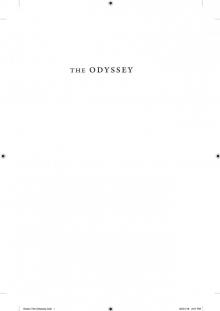 The Odyssey
The Odyssey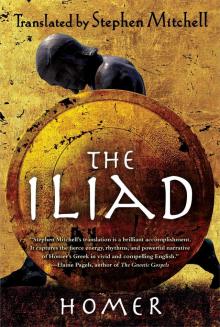 The Iliad
The Iliad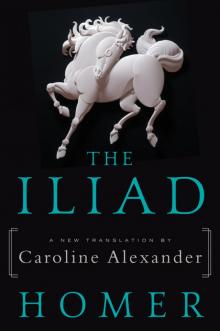 The Iliad (Trans. Caroline Alexander)
The Iliad (Trans. Caroline Alexander)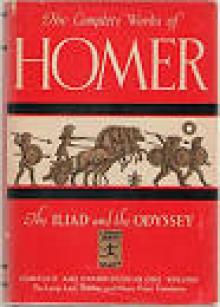 Complete Works of Homer
Complete Works of Homer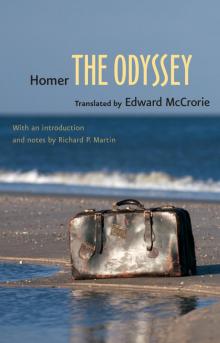 The <I>Odyssey</I>
The <I>Odyssey</I>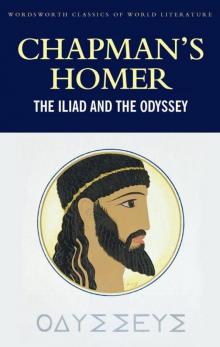 The Iliad and the Odyssey (Classics of World Literature)
The Iliad and the Odyssey (Classics of World Literature)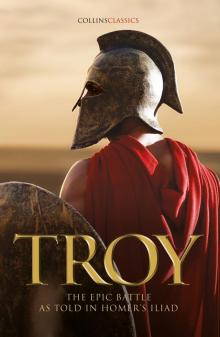 Troy
Troy The Iliad (Penguin Classics)
The Iliad (Penguin Classics)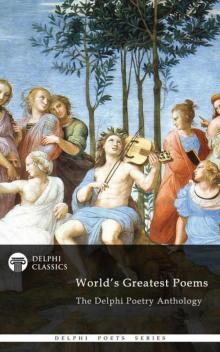 Delphi Poetry Anthology: The World's Greatest Poems (Delphi Poets Series Book 50)
Delphi Poetry Anthology: The World's Greatest Poems (Delphi Poets Series Book 50)